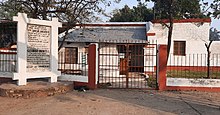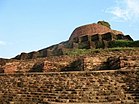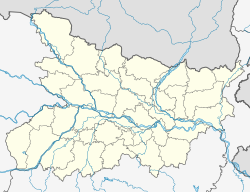Motihari
This article possibly contains original research. (January 2017) |
Motihari | |
|---|---|
City | |
| Nickname: Lake city | |
| Coordinates: 26°39′00″N 84°55′00″E / 26.65000°N 84.91667°E | |
| Country | |
| State | |
| District | East Champaran |
| Ward(s) | 46 |
| Founded by | Moti singh & Hari singh |
| Named for | Champak’ and ‘Aranya’. |
| Government | |
| • Type | Municipal corporation |
| • Body | Motihari Municipal Corporation[1] |
| • MLA | Pramod Kumar (BJP)[2] |
| • Mayor | Preeti Kumari |
| Area | |
| • Total | 236.97 km2 (91.49 sq mi) |
| • Rank | 04 |
| Elevation | 62 m (203 ft) |
| Population (2011)[3] | |
| • Total | 426,158 |
| • Density | 1,800/km2 (4,700/sq mi) |
| Demonym(s) | Motiharivashi, Champaran vashi |
| Language | |
| • Official | Hindi[4] |
| • Additional official | Urdu[4] |
| • Regional | Bhojpuri[5] |
| Time zone | UTC+5:30 (IST) |
| PIN | 845401,[6] 845435, 845437 |
| Telephone code | 06252 |
| ISO 3166 code | IN-BR |
| Vehicle registration | BR-05 |
| Lok Sabha constituency | Purvi Champaran |
| Vidhan Sabha constituency | Motihari |
| Website | eastchamparan |
Motihari is a city and headquarters of East Champaran district in the Indian state of Bihar. It is located 80 kilometres west of Muzaffarpur and 152 kilometres northwest of the state capital Patna. In early days the land of Motihari was ruled by different kingdoms as Videha, Sunga, Kanvas. It is also believed that Champaran used to be a major part of King Janak's empire. Mahatma Gandhi started his famous Satyagraha movement from here.
Geography
[edit]Motihari is located on 26°39' N and 84°55' E in northwestern Bihar.[7] It is about 165 km (103 mi) northwest from the state capital Patna, 45 km (28 mi) from Bettiah, 72 km (45 mi) from Muzaffarpur, 32 km (20 mi) from Chakia, 40 km (25 mi) from Mehsi, and 75 km (47 mi) from Sitamarhi. It is on the east bank of a lake, about 40 km (25 mi) southeast of Bettiah.

Topography
[edit]
The topography of Motihari has been described as scenic, with the "stunning beauty" (in classical terms) of Moti Jheel Lake dividing the town in two halves.[8]
In Gangan Lit-Mag (Gangway Literary Magazine), Austria, wrote Anant Kumar: "The playgrounds of my childhood were the streets of Motihari. Back then that little East Indian town was not overpopulated, and the dry, clean streets of every part of town were ideal for our games: marbles, tops, badminton. And back then Motihari was a wide distance away from the big world. There were very many mango and lichee trees, fragrant lemon bushes, broad, large fields…and very few people. There were scattered decrepit hawelis and bungalows, in which frightening bhuts, geniis and juraels dwelled."[9]
The Gandhi Sangrahalaya has a wide collection of relics and photographs of the Champaran Satyagraha. The Gandhian Memorial Pillar was designed by Nand Lal Bose, a famous artist of Shantiniketan.[10] The foundation stone of the pillar was laid on 10 June 1972 by the then Governor, D. K. Barooch. It is a 48-foot (15 m) tall stone pillar and is situated at the same site where Mahatma Gandhi was presented in court.
Climate
[edit]Climate is characterised by high temperatures and precipitation mainly occurring during the Monsoon Season [June to September]. The Köppen Climate Classification sub-type for this climate is "Cwa" (Humid Subtropical). The highest maximum temperature ever recorded in Motihari was 44.4 °C on May 24, 1903, while the lowest minimum temperature ever recorded in Motihari was 0.0 °C on February 3, 1905.[11] The heaviest rainfall recorded in 24 hours in Motihari was 520 mm on 25 August 2005.
| Climate data for Motihari | |||||||||||||
|---|---|---|---|---|---|---|---|---|---|---|---|---|---|
| Month | Jan | Feb | Mar | Apr | May | Jun | Jul | Aug | Sep | Oct | Nov | Dec | Year |
| Record high °C (°F) | 31.3 (88.3) |
35.6 (96.1) |
42.9 (109.2) |
42.2 (108.0) |
44.4 (111.9) |
43.3 (109.9) |
42.8 (109.0) |
40.5 (104.9) |
40.5 (104.9) |
38.4 (101.1) |
35.6 (96.1) |
30.0 (86.0) |
44.4 (111.9) |
| Mean daily maximum °C (°F) | 22.4 (72.3) |
25.2 (77.4) |
31.0 (87.8) |
35.3 (95.5) |
35.7 (96.3) |
34.8 (94.6) |
32.4 (90.3) |
32.4 (90.3) |
32.2 (90.0) |
31.5 (88.7) |
28.7 (83.7) |
24.4 (75.9) |
30.5 (86.9) |
| Daily mean °C (°F) | 15.4 (59.7) |
17.8 (64.0) |
22.9 (73.2) |
27.4 (81.3) |
29.3 (84.7) |
29.9 (85.8) |
28.9 (84.0) |
28.9 (84.0) |
28.3 (82.9) |
26.1 (79.0) |
21.5 (70.7) |
17.1 (62.8) |
24.4 (75.9) |
| Mean daily minimum °C (°F) | 8.4 (47.1) |
10.5 (50.9) |
14.8 (58.6) |
19.6 (67.3) |
23.0 (73.4) |
25.1 (77.2) |
25.4 (77.7) |
25.5 (77.9) |
24.5 (76.1) |
20.7 (69.3) |
14.4 (57.9) |
9.8 (49.6) |
18.5 (65.3) |
| Record low °C (°F) | 2.2 (36.0) |
0.0 (32.0) |
5.6 (42.1) |
8.3 (46.9) |
13.7 (56.7) |
15.4 (59.7) |
18.9 (66.0) |
19.9 (67.8) |
18.4 (65.1) |
11.4 (52.5) |
6.4 (43.5) |
1.7 (35.1) |
0.0 (32.0) |
| Average rainfall mm (inches) | 12.2 (0.48) |
14.3 (0.56) |
9.1 (0.36) |
24.6 (0.97) |
51.9 (2.04) |
215.0 (8.46) |
366.4 (14.43) |
289.6 (11.40) |
247.6 (9.75) |
50.8 (2.00) |
4.2 (0.17) |
4.7 (0.19) |
1,290.4 (50.80) |
| Average rainy days | 1.1 | 1.3 | 0.7 | 1.6 | 3.0 | 8.5 | 13.8 | 11.6 | 8.8 | 2.2 | 0.2 | 0.5 | 53.3 |
| Average relative humidity (%) (at 17:30 IST) | 69.0 | 58.0 | 49.0 | 46.0 | 52.0 | 68.0 | 80.0 | 80.0 | 79.0 | 73.0 | 71.0 | 70.0 | 66.0 |
| Source: Indian Meteorological Department | |||||||||||||
Demographics
[edit]As of 2011 Indian Census, Motihari had a total population of 126,158, of which 67,861 were males and 58,297 were females, with a sex ratio of 859. Population within the age group of 0 to 6 years was 16,870. The total number of literates in Motihari was 92,798, which constituted 73.6% of the population with male literacy of 76.2% and female literacy of 70.5%. The effective literacy rate of 7+ population of Motihari was 84.9%, of which male literacy rate was 88.1% and female literacy rate was 81.2%. The Scheduled Castes and Scheduled Tribes population was 7,373 and 333 respectively. Motihari had 22,224 households in 2011.[3]
As of 2001[update] India census, the population of Motihari in 2011 was 101,506, of which male and female were 54,629 and 46,877, respectively. The sex ratio of Motihari city is 858 per 1,000 males. Total literates in Motihari city are 69,576 of which 40,265 were males while 29,311 were females. The crude literacy rate of 68.5% and effective literacy (7+ population) per cent of 80.3%. The children aged 0–6 in Motihari city are 14,910, as per the Census India report, in 2001, with 7,811 males and 7,099 females. The child sex ratio of girls is 909 per 1,000 boys.[12]
Education
[edit]
The city hosts a number of institutes and universities for higher education supported by both state and central governments.
- Motihari College of Engineering.
- Mahatma Gandhi Central University
- MS College (Munshi Singh College)
Notable people
[edit]




- George Orwell, author of Animal Farm and Nineteen Eighty-Four, was born in Motihari in 1903. Orwell's father, Richard Walmesley Blair, was posted to Motihari as a Sub-Deputy Opium Agent in the Opium Department of the Indian Civil Service, overseeing the production and storage of opium for sale to China.[13] Orwell's home and the 2.48 acre property was inaugurated as a museum in May 2015.[14][15] At the beginning of 2021, the bust of George Orwell was stolen but soon recovered. Towards the end of 2021, the house of George Orwell was repaired and renovated. Bihar's art, culture and youth affairs department has made the house a protected site. In 1904, his mother Ida Blair along with her children, moved to England never to return to India.[16][17][18][19]
- Khan Bahadur Azizul Huq, one of the two Indian police officers who worked with Edward Henry in the development of fingerprint classification, known as the Henry Classification System, died in Motihari in 1933. "It was Khan Bahadur Azizul Huq who evolved a mathematical formula to supplement Henry's idea of sorting slips in 1024 pigeon holes, based on fingerprint patterns. Rai Bahadur Hem Chandra Bose made further contribution to the fingerprint science by evolving an extended system of sub classification, a telegraphic code for finger impression and a system of single-digit classification."[20]
- Both Haque and Bose eventually received honoraria and recognition from the Government of India. At the time of final approval of the honorarium for Haque, the Home Department (Government of India) noted, "It appears from the information now received that he (Haque) was Sir Edward Henry's principal helper in perfecting the scheme and he actually himself devised the method of classification which is in universal use. He thus contributed most materially to a discovery which is of worldwide importance and has brought a great credit to the police of India."[21] Upon retirement from the Police service in Bengal and Bihar, Khan Bahadur Azizul Huq settled in Motihari, and he is buried there.
- A.F. Salahuddin Ahmed, National Professor of Bangladesh, a grandson of Khan Bahadur Azizul Huq was born in Motihari in 1924. He was educated at Presidency University, Kolkata, University of Pennsylvania, and University of London, and taught at eminent universities in Bangladesh: Jagannath College, Rajshahi University, Jahangir Nagar University, Dhaka University, and Independent University, Bangladesh, and wrote many books and articles in professional journals and newspapers. In one of his books, Perspectives on History, Society and Politics, he argued that despite the political divisions that took place in South Asia in 1947, the people of this vast region belong to "one indivisible civilisation which is the product of over a thousand years of historical development" and that the destinies of the people inhabiting the subcontinent are closely interlinked. They must therefore learn to live together in peace, as this is essential for their development and progress.
- Ramesh Chandra Jha, a modern Hindi poet, author and freedom fighter belonged to Phulwariya village in Motihari.
- Thakur Ramapati Singh, a freedom fighter, MLA, Minister, and MP from Motihari.
- Anant Kumar (born 1969 in Katihar/Bihar), a German author, translator and literary critic of Indian descent. He spent his childhood in Motihari where his father Rajendra Prasad was Professor of Psychology at Munshi Singh College. He resides in Kassel, Germany. Royal City Gotha (Free state Thueringia, Germany) honored Kumar as a Resident Writer in 2015.[22] Kumar worked 2016 as a fellow in the symposium for dramatic writing at Volturno, Italy.[23] University of Kassel has picked Kumar among prominent alumni on its diamond jubilee celebration 2021.[24] In 2024 he was counted among the representative citizens in the city of Kassel, North Hess, Germany.
- Vallabha, was an Indian saint and philosopher. He founded the Krishna-centered Pushtimarg sect of Vaishnavism in the Braj (Vraja) region of India,[1] and propounded the philosophy of Śuddhādvaita.
Vallabha was born in a Telugu Tailang Brahmin family that was residing in Motihari. They escaped to Kashi of United Provinces state while expecting a Muslim invasion in Varanasi during the late 15th century.[2]
- Anuranjan Jha, journalist, TV anchor and social worker.
- Ravish Kumar, TV anchor and journalist, NDTV Delhi.
- Abdullah Khan (author) is a novelist, screenwriter and banker.
- Radha Mohan Singh, Union Minister of Agriculture & Farmers Welfare.
- Sakibul Gani, first cricketer in the world to score a Triple century on his First class debut.
- Sanjeev K Jha, is a film maker and screenwriter, currently based on Mumbai who wrote several popular TV shows and films. Jabariya Jodi, Barot House and Sumi (film) are his notable works. Also, the first writer from Motihari who's written film Sumi (film) got three National Film Awards.
- Raksha Gupta, actress in many notable Bhojpuri films Thik Hai, Commando Arjun,[25][26][27] Rowdy Inspector (2022 film), Doli Saja Ke Rakhna (2022 film), Shankhnaad.[28][29]
Connection with Gandhi
[edit]Motihari, at that time simply called Champaran, was close to Mahatma Gandhi. He came to Motihari on April 15,[30] 1917[31] with Raj Kumar Shukla to start the Satyagraha movement in Champaran, known as Champaran Satyagraha, which concerned the exploitations of farmers.[32][33] Gandhi with his supporters held a big campaign in Champaran.[34] His frequent visits to Champaran and its local areas showed the Gandhi's connection with land. He also understood the cultural and social backwardness of the area, he acted immediately by creating schools and ashrams.[35]
References
[edit]- ^ "Motihari Municipal Corporation". eastchamparan.nic.in. Retrieved 31 December 2020.
- ^ "Motihari Election Result 2020 Live Updates: Pramod Kumar of BJP Wins". News18. 10 November 2020. Retrieved 2 January 2021.
- ^ a b "Census of India: Motihari". www.censusindia.gov.in. Retrieved 20 December 2019.
- ^ a b "52nd Report of the Commissioner for Linguistic Minorities in India" (PDF). nclm.nic.in. Ministry of Minority Affairs. Archived from the original (PDF) on 25 May 2017. Retrieved 23 March 2019.
- ^ "Bhojpuri". Ethnologue. Retrieved 8 September 2020.
- ^ "Motihari Pin Code". www.pincodeinfo.online.
- ^ "Google Maps". Google Maps. Retrieved 25 January 2020.
- ^ Mandal, R. B. (2010). Wetlands Management in North Bihar. ISBN 9788180697074.
- ^ http://www.gangan.com/lit-mag/36/index.shtml Archived 12 December 2016 at the Wayback Machine
- ^ PTI (1 October 2019). "Champaran: Where mall meets Mahatma but there's reverence and remembrance too". Business Standard India. Retrieved 7 January 2020.
- ^ "Climate of Bihar.pdf" (PDF).
- ^ "Census of India 2001: Data from the 2001 Census, including cities, villages and towns (Provisional)". Census Commission of India. Archived from the original on 16 June 2004. Retrieved 1 November 2008.
- ^ Taylor, David John (2003). Orwell (1. publ ed.). London: Chatto & Windus. ISBN 978-0-7011-6919-0.
- ^ Haleem, Suhail (12 August 2014). "The Indian Animal Farm where Orwell was born". BBC. Retrieved 12 August 2014.
- ^ Jha, Giridhar (17 May 2015). "George Orwell's house in Bihar turned into museum". India Today. Retrieved 27 February 2021.
- ^ "'1984' Author George Orwell's Bust Vandalised At His Birthplace Motihari In Bihar". indiatimes.com. 14 January 2021.
- ^ Bhattacharyya, Debashis (14 November 2004). "All's not well with Orwell". The Telegraph. Calcutta, India. Retrieved 27 February 2021.
- ^ Tewary, Amarnath (1 August 2005). "Makeover for Orwell's India home". BBC News. Motihari, Bihar. Retrieved 27 February 2021.
- ^ "Big Brother can't be bothered". The Times of India. Archived from the original on 12 October 2013. Retrieved 27 February 2021.
- ^ Tewari, R. K.; Ravikumar, K. V. (1 October 2000). "History and development of forensic science in India". Journal of Postgraduate Medicine. 46 (4): 303–8. PMID 11435664. Retrieved 20 December 2019 – via www.jpgmonline.com.
- ^ Sodhi, GS, & Kaur, JK: The forgotten Indian pioneers of fingerprint science
- ^ "Kurd-Laßwitz-Stipendium". www.gotha.de. Retrieved 20 December 2019.
- ^ "Summer School Südtirol 2016 Für Dramatisches Und Essayistisches Schreiben — Thema: Unsere Utopien | Nids | Neues Institut für dramatisches Schreiben". Retrieved 20 December 2019.
- ^ "Die Universität Kassel im Wandel der Zeit. Zeitzeugengespräche mit Alumni – Podiumsdiskussion" (PDF). Retrieved 17 November 2021.
- ^ "Pradeep Pandey, Kajal Raghwani and Raksha Gupta starrer 'Commando Arjun' trailer is out!".
- ^ "Bhojpuri Actress रक्षा गुप्ता तीसरी ही फिल्म में दिखीं बोल्ड, रियल लाइफ में अदाएं देख उड़ जाएंगे होश! Photos".
- ^ "पर्दे पर बोल्ड सीन देकर भोजपुरी एक्ट्रेस Raksha Gupta ने मचाई हलचल, ऐसा था फैमिली रिएक्शन".
- ^ "Raksha Gupta distributes food to the needy on her birthday".
- ^ "Yash Kumar and Raksha Gupta begins shooting for 'Shankhnaad'".
- ^ "Gandhi Ji in Champaran". eastchamparan.nic.in. Retrieved 7 December 2022.
- ^ "Champaran Satyagraha | The Story of Gandhi | Students' Projects". www.mkgandhi.org. Retrieved 15 July 2021.
- ^ "Gandhi's Satyagraha in Champaran". INDIAN CULTURE. Retrieved 15 July 2021.
- ^ "Champaran Satyagraha- India's First Civil Disobedience Movement". Jagranjosh.com. 1 December 2020. Retrieved 15 July 2021.
- ^ Lal, Vinay (3 October 2018). "Gandhi and the printed image". The Hindu. ISSN 0971-751X. Retrieved 15 July 2021.
- ^ Fischer, Louis. The life of Mahatma Gandhi. ISBN 978-1-78470-040-9. OCLC 921185512.





